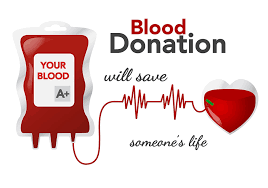Blood shortage fears as lockdown continues
Lorem ipsum dolor sit amet,sed diam nonumy eirmod tempor invidunt ut labore et dolore magna aliquyam erat, At vero eos et accusam et justo duo dolores et ea rebum. Lorem ipsum dolor sit amet, no sea takimata sanctus est Lorem ipsum dolor sit amet. Stet clita kasd gubergren, no sea takimata sanctus est Lorem ipsum dolor sit amet. no sea takimata sanctus est Lorem ipsum dolor sit amet. no sea takimata sanctus est Lorem ipsum dolor sit amet. sed diam voluptua.

Public health authorities and blood services are concerned with decreasing blood donations, which will have adverse effects on medical services that require transfusions.
Globally, since the introduction of lockdowns to curb the spread of the coronavirus pandemic, medical facilities have faced unique and challenging environments, where medical services are struggling to adjust. Health experts have raised concerns about the blood donation cycle, which has been disturbed by national lockdowns across the world, and has led to global blood shortages.
At the time of writing, the South African National Blood Service (SANBS) blood stock levels are at 4.9 days of supply. Its platelet stock is at 0.4 days of supply, while supplies of rarer blood types are especially limited, with O- at only 36% of capacity.
Speaking to Health-e News, Jackie Thomson, medical director at SANBS says that the organisation only has around five days of blood supply “should the blood service grind to a halt tomorrow. Fortunately, we collect blood everyday therefore we continuously fill the inventory with units.”
SANBS aims to collect 3 000 units of blood per day to ensure a safe and sufficient supply of blood in the healthcare system.
But during the current lockdown, Thomson says, they have collected 40% less than their usual donation amount. Thomson says this is due to donors staying at home and the cancellation of blood drives at schools and businesses.
In a new study published in Anaesthesia and Analgesia, 43 experts from around the world underscore the essential role that patient blood management (PBM) can play during and beyond the current pandemic.
“PBM is an evidence-based bundle of care to optimise medical and surgical patient outcomes by clinically managing and preserving a patient’s own blood,” reads the article.
Blood management critical
Given the current resource constraints related to the Covid-19 pandemic, Professor Axel Hofman, Trustee of the International Foundation for Patient Blood Management (IFPBM) says the immediate and global implementation of PBM is even more urgent.
“In very simple terms, the medical team makes sure a patient has enough reserves of his/her own blood before surgery and loses as little blood as possible during and after surgery,” Hofman explains.
He adds that “numerous clinical studies around the world have shown that PBM significantly improves patient outcomes, including morbidity and mortality while considerably reducing the demand for donor blood.”
Hofman also believes that the medical community is facing “significant unknowns” and must “adopt other solutions to continue and resume care of patients.”
Thomson shares the same sentiments, saying that elective surgery has decreased, meaning that less blood was needed and used. But “From two weeks ago, surgery has commenced due to emergencies and we are seeing an increase in usage.”
“We, therefore, need to ensure that patient blood management principles are applied, as we fear that blood shortages will start developing,” he says.
Donor blood restrictions
While different countries have different responses to blood shortages, Hofman says an alternative response to reduced blood supplies and the limited capacity of health care facilities is the suspension of elective surgical procedures.
“This has been seen in many countries around the world. It presents challenges however, in that the delaying of surgery leads to an enormous backlog. In some cases, cancellation of elective surgeries may permit disease progression resulting in more complex and urgent situations, as the pandemic further progresses,” he tells Health-e News.
Experts say other option to reduce blood utilisation during the crisis – and beyond – is a more restrictive use of donor blood products, such as wherever possible, administering single-unit rather than double-unit transfusions. Experts also encourage the use of more restrictive transfusion thresholds.
“Managing a patient’s own blood is a much better option than resorting to donor blood in the first place, and it saves cost,” Hofman adds.
SANBS Covid-19 hygiene protocol
The SANBS has implemented robust protocols for assessing donors and cleaning donor centres at this time, including:
Enhanced frequency of cleaning all equipment and surfaces,
active wellness screening before individuals enter the building and at their first point of contact when they enter,
donor beds thoroughly cleaned after each use,
social distancing – when on donation beds or on waiting chairs, donors will be at a minimum of two meters apart, and;
strict screening of our staff and the provision of protective equipment to prevent infection.
The organisation’s Western Cape branch has recently partnered with Facebook to allow Facebook users to sign up as blood donors online, and invite friends to donate blood with them when blood donor centres close to them have an urgent need for blood supply.
South Africa is the first African country trialling this feature, and “this initiative comes at a crucial time as the country starts to see a significant drop in blood donations as a result of people staying home to prevent the spread of Covid-19,” the SANBS statement notes. – Health-e news







